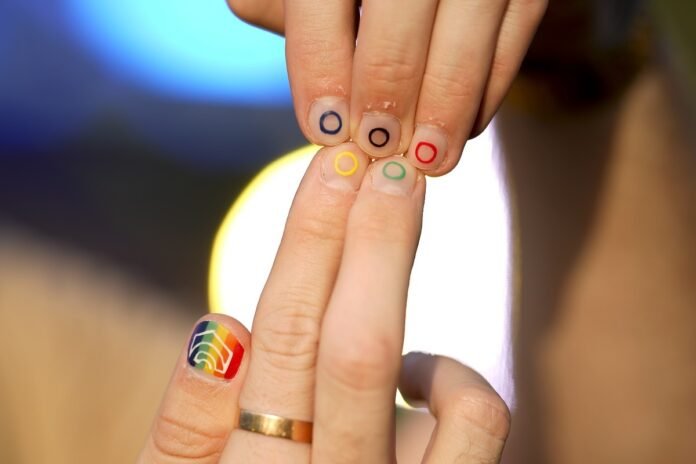Jeremy Goupille shows off his rainbow-colored nails and Olympic rings at the opening of Pride House, the safe space for the LGBT+ community of athletes, during the 2024 Summer Olympics, Monday, July 29, 2024, in Paris, France.
11:26 JST, July 30, 2024
PARIS (AP) — When Charline Van Snick flirted with another female athlete after winning the bronze medal in judo at the 2012 Olympic Games in London, her coach told her she had to remain in the closet for the future of her career.
“It was a moment where I didn’t feel like myself,” said the 33-year-old retired Belgian Olympian. “He said, Charline, you have to fit into the box. Everyone is looking at you and you have to be straight. … I understood that it’s not a place to be yourself, it’s not a place to be LGBTQ+.”
While the Olympics have made great strides since then — the 2024 Paris Olympics set a record for the largest number of openly LGBTQ+ athletes — advocates and athletes say international athletics still has a long way to go in opening up to the queer community.
During the opening ceremony of the Olympic Games, Thomas Bach, President of the International Olympic Committee, sent a message to the world in his speech: “In our Olympic world, we all belong.”
Parisian officials continued their push for inclusivity Monday night with the opening of the Olympic Pride House, set on a boat floating on the city’s famed Seine River. Amélie Oudéa-Castéra, France’s minister of sports and the Olympic and Paralympic Games, told The Associated Press that they were sending “a message of inclusivity” in these Games.
“It is important for Paris to continue to fight against all forms of discrimination,” Oudéa-Castéra said. “We need to encourage this progress in society and the reason I am here today is because sport is a very powerful agent to do that.”
The Paris Olympics broke a record by having 191 openly LGBTQ+ athletes compete, according to Outsports, a website that compiles a database of openly queer Olympians. The number surpassed the 186 athletes who competed at the COVID-19-postponed 2021 Tokyo Olympics.
The Olympic officials’ messages and the record were welcomed by many in the LGBTQ+ community, including 31-year-old Matt Clark, among those celebrating the opening of the Pride House. Clark said Paris “started a legacy that will continue in other Games.”
“It’s going to continue to spread the message to other athletes and youth around the world that it’s okay to be gay and it’s okay to be queer and that you have a future,” Clark said. “Five, 10 years ago, you had coaches telling your athletes not to come out because it would ruin your career. Now it’s become a stepping stone for people’s careers.”
Clark cited the rise of British diver Tom Daley as an example.
The number of openly LGBTQ+ Olympians has increased dramatically in recent decades. Outsports co-founder Jim Buzinski said that when they started tracking athletes at the Sydney Olympics in 2000, they only counted about five openly LGBTQ+ athletes.
“More and more people are coming out,” Buzinski said. “They realize that it’s important to be visible because there’s no other way to get representation.”
Van Snick said it took her a long time to truly feel comfortable with her own sexuality, and that she wasn’t able to do that until she stepped out of the spotlight.
She called the ongoing debate disappointing, and in some cases also cited the exclusion of transgender athletes from Olympic events.
“The world has grown since I was an Olympic medalist,” Van Snick said. “But when I think about the trans issue, we still have a long way to go.”
Still, Buzinski and LGBTQ+ activists see the Paris Olympics as an opportunity for athletes from parts of the world where competitors are not allowed to be openly gay due to strict restrictions on queer populations.
“When they come to Paris, when they come to France, they can be themselves,” said Jérémy Goupille, co-president of Pride House at the Paris Olympics.
First hosted at the 2010 Olympics, the Pride House is located on a boat on the River Seine and serves as a meeting place for the queer community during the competition.
Goupille said there are still safety concerns for many athletes. Dating apps like Grindr, Bumble and Tinder have long been used as a shield for gay athletes who want to connect with other queer people in the countries where they compete but don’t want to feel publicly exposed.
But he said that at previous Games some have tried to expose athletes who are not officially eliminated by checking people’s height, weight and location on those apps.
That’s why Grindr announced that it has disabled location-based features in Paris’s Olympic Village where athletes will be staying and other official areas of the Games. According to Grindr, this would allow LGBTQ+ athletes to “connect authentically without worrying about prying eyes or unwanted attention.”
The app made the same decision for the 2022 Beijing Olympics.
“If an athlete is not out or is from a country where being LGBTQ+ is dangerous or illegal, using Grindr may put them at risk of being exposed by curious individuals who can identify and expose them through the app,” Grindr said in a statement.
Disabling these features sparked criticism on social media last week after users reported problems opening the app in the Olympic Village.
“You have to protect them because there are so many bad people. At the same time, there are so many beautiful athletes,” Goupille said. “They want to meet someone and that’s hard.”



